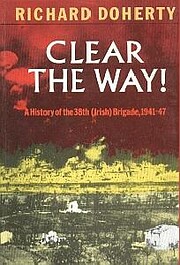

Klik på en miniature for at gå til Google Books
|
Indlæser... Clear the Way: A History of the 38th (Irish Brigade, 1941-47)af Richard Doherty
Ingen Der er ingen diskussionstråde på Snak om denne bog. Ingen anmeldelser ingen anmeldelser | tilføj en anmeldelse
In October 1941 Winston Churchill conceived the idea of creating an Irish Brigade in the British Army that would evoke the memory of the Irish Brigades of old. The new Irish Brigade came into being in 1942 and first saw action in Tunisia. From North Africa the Brigade went to Sicily where its capture of the mountaintop town of Centuripe was hailed across the world as a tremendous feat of arms. Its reputation as an outstanding Brigade had now been made and it was to add to this as the Italian campaign progressed; its achievements at Cassino, at Lake Trasimene and at the Argenta Gap rank among the greatest of the Second World War. By the end of the war the Irish Brigade was considered the finest fighting formation in the British Army. Composed of Irishmen from all four provinces, it later included many Englishmen but never lost its Irish identity, thanks to the efforts of its commanders. The first of these, Brigadier The O'Donovan, considered that he had donned the mantle of Sarsfield. He was succeeded by Nelson Russell, who led the Brigade through Tunisia, Sicily and the early part of the Italian campaign before handing over to Pat Scott, one of the finest fighting brigadiers of the war. On many occasions the Irish Brigade were the first in action and the Gaelic motto of the Royal Irish Fusiliers - Faugh A Ballagh, Clear the Way - sums up their fighting role. They earned the respect of friends and enemies alike for their courage and fortitude. This book does full justice to their record. No library descriptions found. |
Current DiscussionsIngen
 Google Books — Indlæser... Google Books — Indlæser...GenrerMelvil Decimal System (DDC)940.412417History and Geography Europe Europe Military History Of World War I Operations And UnitsLC-klassificeringVurderingGennemsnit: (4) (4)
Er det dig?Bliv LibraryThing-forfatter. |
||||||||||||||||||||||||||||||||||||||||||||||||||||||||||||||||||||||||||||||||||||||||||||||||||||||||||||||||||||||||